Ideal for candidates for the Coastal Skipper practical course & Yachmaster Offshore exam. Some revision of the Day Skipper shorebased course plus more advanced skills in offshore & coastal navigation by day & night, pilotage & meteorology.
Knowledge to the level of Day Skipper Shorebased.
40 hours plus exam time
Position fixing, course shaping and plotting, tidal knowledge, use of almanacs and admiralty publications, electronic position finding equipment, taking and interpreting forecasts, plotting weather systems, weather predictions using a barometer.
Background knowledge to skipper a yacht on coastal passages by day & night.
This is a shorebased course that can be taken in the classroom, online or by distance learning.
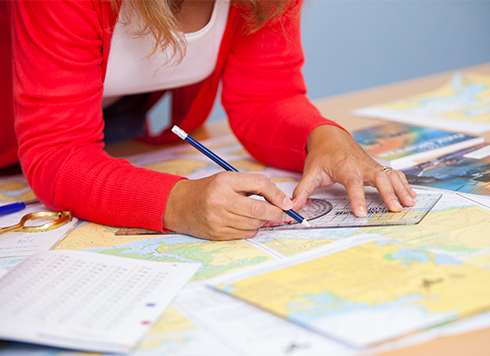
RYA Navigation Handbook 2nd Edition
£19.99
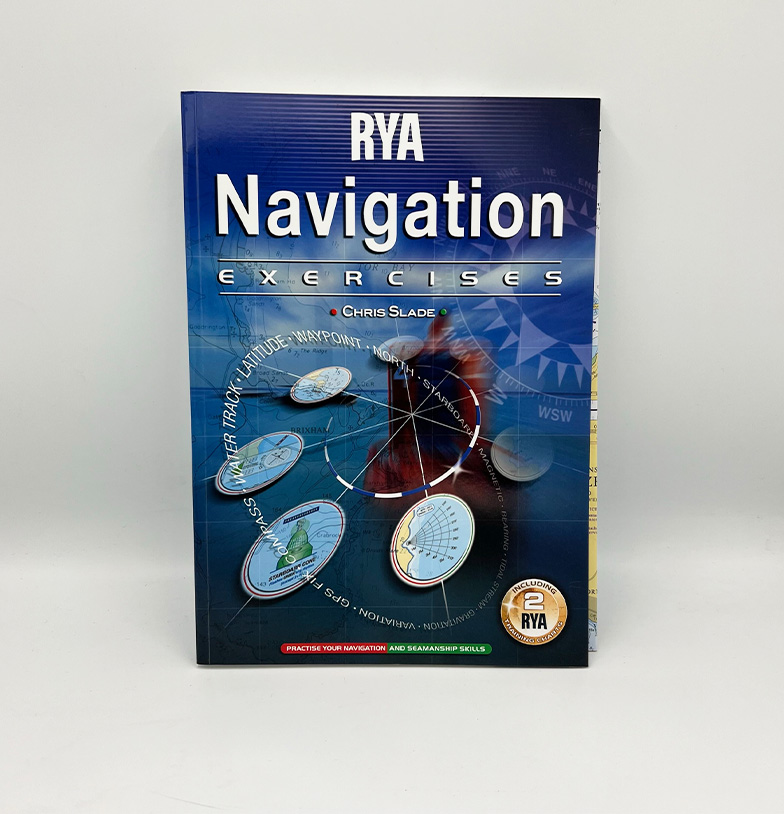
RYA Navigation Exercises
£22.99

Yachting Monthly
- Digital edition

How to prepare for your Yachtmaster Offshore exam
- Theo Stocker
- August 16, 2024
In an age of digital navigation and walk ashore pontoons, how hard can the RYA Yachtmaster Offshore be? Theo Stocker prepared to take the test to find out

Many very competent and highly experienced yachtsmen and women don’t have any qualifications at all and are content to keep it that way, but for some reason, not being a Yachtmaster bothered me. I was pretty sure I was up to the standard, but I didn’t know.
Once you’ve got the ticket, you become an RYA Yachtmaster, something I’ve wanted to do for years. My friend Andrew and I have been talking about doing it since before his son Daniel, now 16, was born. Perhaps it was time to finally get on with our RYA Yachtmaster Offshore.
Every course I have done up to this point, from RYA Dinghy Level 2 all the way up to Coastal Skipper (some 20 years ago) has been one of the RYA’s ‘course-completion’ qualifications – do the week and if you can do what’s on the syllabus, you get the ticket, signed off by your training centre.
The RYA Yachtmaster Certificates of Competence (Coastal, Offshore and Ocean), however, are run by the RYA under the authority of the Maritime Coastguard Agency (MCA) and as such, they are the pinnacle of training for amateur sailors, and the start of the ladder of commercial qualifications, required for anyone who wants to work as a professional seafarer. You have to meet the pre-entry requirements, but passing is based purely on how you fare during a potentially gruelling day-long practical exam.
It’s now 51 years since the RYA took over examining Yachtmasters from the Board of Trade (now the MCA) in 1973, and Yachting Monthly was, in a small way, involved in shaping some of the practical seamanship elements of the exam.
Clearly, a lot has changed in the intervening years – navigation technology, engines, deck-gear, marinas, and not least the boats themselves. I was eager to see how the RYA Yachtmaster scheme has changed with the times, and if, like many other aspects of sailing, it has simply become easier, or whether it is still the challenging test it always was.

The crew (L-R): Matt Sillars, Andrew Eastham, Row Staples and Theo Stocker
What was I letting myself in for?
From the outset, the RYA were keen to emphasise that Yachtmaster is not an attendance-based course, but a one-day exam in which an examiner will form an objective opinion of your abilities, and will recommend you to the RYA/MCA Yachtmaster Qualification Panel to become a Yachtmaster, or not.
Technically, no instruction is required before the exam and the theory course is not compulsory. However, taking the exam is a significant investment of time and money if you’re not confident of passing, and you will certainly need theory knowledge of the level of the RYA Yachtmaster Offshore shorebased course, with practical experience and skills to match that, to stand any chance of passing.
It is strongly recommended, therefore, that you have a few days’ preparation, ideally immediately before the exam, with the same boat and crew as you’ll have for the exam so you’re at the top of your game. You don’t want to be getting to know the foibles of a boat or crew whilst trying to exude an air of calm and knowledgeable competence.

A hearty meal every evening, and the occasional beer, keep the crew going
Many sailing schools offer places on a Yachtmaster preparation course, normally of five days, for four candidates, with two days of examination at the end of it, as only two candidates can be examined in any one 24-hour period, the exam being a marathon 8-12 hours for one person, and 10-18 hours for two. No more than four candidates can be examined at a time, as they are long days for candidate and examiner alike.
It was also made abundantly clear that while we had four days to prepare, this was not a course on which we could be taught what we needed to know; this should have been gained over our years of experience. The week’s aim was to run through the whole Yachtmaster syllabus to strip away any bluster, revealing to the cold light of day our weaknesses and bad habits.
Rough edges would be polished, but if we were learning new skills for the first time, then we probably were not quite ready for the exam just yet. No pressure!
What Yachtmaster Offshore instructor Matt Sillars says
The week is not a course to learn to be a Yachtmaster Offshore. You need to have done 90% of the work beforehand. The preparation days are about checking skills and finding where you need more work, rather than being taught skills. It’s also very difficult to fake experience and an examiner will spot someone exaggerating their skill set very quickly.

Matt helps Theo and Andrew with some last-minute revision of tidal corrections
Getting prepared for the Yachtmaster Offshore
As I prepared for the week, I quickly found I’d had significant ‘skills fade’ in my detailed knowledge of the Collision Regulations, particularly lights, shapes and sounds, and buoyage light characteristics.
You’ll need a good working knowledge not just of the most common parts of the rules, but of the whole lot, including some of the more esoteric corners of the rule book. Professional seafarers are expect to know every word verbatim; Yachtmasters need to be getting at least 80% of the lights and shapes right, and importantly be able to demonstrate that they understand them, to pass.
Article continues below…

The history of the RYA Yachtmaster scheme as it turns 50
The RYA started examining Yachtmaster candidates in 1973 but in fact the very first Yachtmaster certificates were awarded much earlier.…

12 expert skills to take you beyond Yachtmaster
Rupert Holmes outlines the skills that mark out the good sailors from the great ones, with experience and reflective learning…
The lights shown by trawlers shooting gear, towed vessels of the bizarest dimensions and sizes, and the sound signals of vessels in all sorts of pickles were initially, at best, a little foggy.
It’s easy to feel that in normal, coastal sailing you come across these intricacies so rarely as to make them irrelevant, but the point of the Yachtmaster is that you are able to operate at sea not as an amateur, but on a par with professional seafarers.
Indeed, with a commercial endorsement to your RYA Yachtmaster, you could easily be one of them, if you ever fancied a career change. Knowing the rules also diminishes the chances of ending up in front of an inquest. The detail is fiddly, but it’s not impossible to learn.

Everyone knows the motoring cone, but do you use it? And what about the other shapes?
IRPCS are something you just have to know, and it would be a real shame to fail your Yachtmaster because you hadn’t brushed up beforehand. For ease, many examiners will use packs of flip cards to test your knowledge of lights, shapes, buoyage and collision avoidance during a quiet moment on exam day. It’s not meant to be an interrogation, but if you’re getting more than two in ten wrong then the examiner won’t be able to pass you.
One little tip with sound signals are that it is easy to get overwhelmed once you start adding in all the extra sounds to the basic signals, but there are only a few distinct meanings to remember. These then get added together, but can easily be broken into their composite parts to help you decipher their meanings.

A safety brief can be tailored to your crew, their level of experience and their familiarity with your boat
Yachtmaster Offshore training
The forecast for the week couldn’t have been much better. Typically, the only day there wasn’t sunshine and a decent breeze was the day we had the photographer on board, but the rest of the time there was enough wind to get our teeth into – there’s nothing like trying to sail onto a mooring if there’s no wind, and it’s often a stiff breeze that makes marina manoeuvring tricky.
The aim for day one was to run through the full gambit of skills that would be tested in the exam for Matt to get an idea of where Andrew and I were at. With the food and kit stowed, the day began with the usual safety briefings, engine checks and discussion regarding firefighting.
Safety briefs
A good skipper will always make sure their crew have had a safety brief. If you sail with the same crew on a regular basis, you don’t need to give them the same briefing every time, but an occasional reminder of the main points is probably a good idea, as the details quickly fade. For us, the safety brief was about making sure the people we had on board knew where everything was on a boat they hadn’t sailed before.

Keep tethers and first-aid kit somewhere accessible
For a crew of novices, we would have included things like how to use a fire extinguisher and how to put on a lifejacket, but for experienced sailors, it is sufficient to show them where safety kit is, so things like tethers, fire-fighting equipment, seacocks and softwood bungs, as well as how the distress and MOB functions on this boat’s particular chartplotter and VHF radio work, are all relevant.
On deck, knowing were the MOB recovery kit, engine fire extinguisher and liferaft are is all important.
I’ve been doing engine checks for years, and it’s easy to be familiar with your engine at a basic level. Various acronyms exist to help remind you about what to check, but advice has changed recently to add in one sensible step to an engine check and that is to isolate the engine before opening the case.
You may do this already, but if you don’t, there’s a risk that in the usual melee of getting ready to set sail, someone on deck goes to start the engine while you’ve got your hand on the drive belt. Better switch off the isolator so this can’t happen until you’re done.
The acronym I found most helpful was: IWOBBLE: Isolate; Water (strainer); Oil (level and colour, engine and transmission); Belt (wear and tension); Bilges (empty); Leaks (no oil or fuel spills); Exhaust (clean, and water once the engine has started).

Every boat is different, such as MOB marking systems
It’s worth making sure any experienced sailors on your boat also know how to do some of these so that you as skipper don’t have to be the one with your head stuck in the engine bay when the engine fails on the way into harbour.
Dabs of high-vis paint on the relevant fittings can help direct you to the correct nut to loosen or tighten for each job.
In the exam, you may not have to bleed the engine, but you will need to talk through how you would handle various engine emergencies, from fires to fuel starvation, overheating and prop wraps, so spend time getting familiar with the fuel, water and cooling systems on your boat’s engine so you can point at the right bits.

Marina manoeuvres fill many cruising sailors with dread
Yachtmaster Offshore marina manoeuvres
With the boat and crew ready to go, it was time for our first go at ‘pontoon bashing’. It’s always going to be a little nerve-wracking handling a boat you don’t know well in the confines of a windy and tide-swept marina, so it’s a useful tool for the instructor to quickly get a gauge on your level of confidence and ability.
As someone who normally keeps a boat on a mooring and anchors at every available opportunity, tricky marina berths are something that I rarely visit, so this was a skill that needed a little more attention for me.
‘Parking’ can sometimes look a little boring to the outside observer, but serried ranks of expensive boats and vicious bow rollers and anchors makes this an exercise to really focus the mind. It also forces you to attempt berths that in normal sailing you would often rather avoid, but may be forced to use in a busy marina.

Check prop kick astern when alongside, then try out how the boat responds in open water
Get your bearings
To start, we took time to check the depth sounder was accurate using a leadline, and checking whether it was set to depth below the keel or below the waterline – a critical piece of information. While alongside, put the engine astern and have a look which side the prop wash emerges. The stern will kick to the other side when engaging astern.
We checked the boat’s pivot point too in ahead and astern, and how long the boat needed to get steerage in either direction. All of this can be done in open water.
Assessing the wind and tide is essential before you start a manoeuvre, factoring in what these will be doing in the berth itself, and not just out by the marina entrance. At Mercury Yacht Harbour, when the tide is in full spate, you can get a nasty diagonal cross-current across the berth, and some owners simply avoid coming or going at anything other than slack water.
Letting the boat come to a stop will show how she will want to lie.

Approaching a finger berth will be easier if it is on the outside of your turn
Tricky berths
We then tried a number of different berths of ascending difficulty – coming alongside an open hammerhead was straightforward, where slotting in between two already-moored boats took a little more planning.
Getting in and out of a large bay in which several boats are moored adds complication. In this case, with a strong westerly and an ebbing tide, I concluded it would be easier to do the whole manouevre in astern rather than switching direction and losing steerage part way through.
Don’t forget to think about how you’ll get out of the berth, how other boats will lie, and whether you want wind or sunshine in the cockpit and companionway.

Communicate to crew which lines you want let go first, before you start the manoeuvre, then keep them updated with what you’re doing
Getting into finger berths was straight-forward if they were ‘open’ berths, on the near side of the pontoon so that as the boat slides around the turn, her momentum carries her onto the berth. ‘Closed’ berths, on the far side were trickier, and often demanded going in past the berth, then either turning or reversing direction.
Switching which way you want to lie in the berth may necessitate starting the whole thing in astern rather than ahead. Be ready for this to be a spectator sport as onlookers wait for a victim like Romans in a Colosseum.
Judging what the tide and wind will do to your boat are key to marina manouevring. You also need to know which way the boat will ‘want’ to go in any given situation, and then use it to your advantage – think about stern kick, slide and pivot points.
It’s easy to think about bow and stern springs, but a midships line is one of the most useful. Drive against it in forwards while steering away from the pontoon to bring the bow in and hold the boat parallel.

Motor against a stern line to hold the boat alongside
It is also helpful to think about the ‘favoured’ side every time you enter a marina row. Given the prevailing conditions, you will be pushed to one side or the other, and you want to stay on the upwind or uptide side to keep your options open and your hull clear of the bow rollers waiting to leeward.
A ball fender is a really useful tool as it won’t roll out in the same way as a sausage fender and it has more give in it. Rig it at the point of main load before a manoeuvre.
Don’t forget to have an exit strategy if the approach doesn’t go according to plan so you can get out and try again.

It’s not cheating to have worked out in advance the tidal heights for where you will be sailing on the day of your exam (the beer is optional, but also helps)
Yachtmaster Offshore navigation
Getting a boat from A to B safely and effectively is still at the heart of the RYA Yachtmaster qualification, as it has been from its inception. The tools available to help us navigate have changed dramatically since 1973, however, and even in the last decade have been transformed.
GNSS, chartplotters, AIS, smartphones and internet access have resulted in a revolution. Many sailors have ditched paper almost entirely these days, so have the traditional navigation skills of the Yachtmaster scheme become irrelevant?
On our first evening, Matt set us homework; Andrew would take us from Hamble into the Beaulieu River and I would bring us back. Hardly a challenging trip, and one I’ve often done with little more than cursory planning. That’s not the point though, as if these were unfamiliar waters, I would need to navigate us much more accurately and actively, so this short trip was designed to test our pilotage and passage planning skills.

There was a good list of things to prepare for each day, and ahead of the exam
Definitely not cheating
Electronics and internet-based sources of information were not only allowed, but expected and encouraged for this exercise, albeit we also had to demonstrate our ability to use the ‘old-fashioned’ methods of calculating secondary port tidal heights, tidal streams and courses to steer.
While chartplotters on your phone may have freed us up from the old cliche of the skipper bobbing up and down to the chart table like a rabbit, it is equally as easy to fall into the trap of staring dumbly at our phones, driving a triangle across the screen, all but unaware of where we are in relation to the real world.
The trick is to be able to use every source of navigation information to make sense of the world around you and to sense-check that information against multiple sources of data.

It takes time to put your passage plan into the plotter and to make sure the plotter is set up to give you the information you need
It felt like cheating to be able to get tidal heights from my phone, but I also found the planning stage almost busier as a result. Many online sources of data, especially data, come from unknown origins and can vary a surprising amount, so don’t assume that what a screen is telling you is accurate data. Navionics and Admiralty EasyTides can disagree by up to an hour at times.
It’s also easy to let a machine work something out for you and suggest a route that makes sense on screen, but doesn’t work well in reality. It won’t factor in a good offing from a shallow lee shore, and nor will it care if the waypoints, and therefore the courses you’re steering, are easily identified visually from on deck. A single, long course, with an obvious headmark will be much easier for the helm to steer than lots of short ‘artificial’ courses. Secondary port calculations caused us both headaches as we dragged the process out of our long-term memory. Which way to interpolate and between which numbers is surprisingly easy to get wrong under pressure.
The strengths of paper
Inputting our plans into the chart plotter also takes time, as much from finding where all the dratted functions are in the plotter’s menu options as form the basic principles. For most plotters, planning remains something they do not do well, and using paper is often still faster and easier to get an overview of where safe water is. I’ve also yet to find a way to calculate a proper course to steer on a chartplotter yet, even for a single hour, let alone a longer passage.
When it comes to pilotage, a plotter or phone on deck is enormously helpful to see where you are. It isn’t however, the easiest way to present the essential information you need at your fingertips, and a notebook with pre prepared information is the best place to list expected tidal heights, alongside a sketch of buoys, lights, courses, radio comms and anything else you’ll need to know.

A sketch chart can quickly convey a huge amount of information
In many ways, the job of a small vessel navigator has got harder rather than easier, as more and more tools are at our disposal to use. Not only do you need to be able to read a chart and plot a fix, but you need to be able to navigate your way through multiple phone apps, plotter menus and be able to extract the right information from your radar and AIS.
It is very easy to get distracted from the main thing, which is keeping your head up and out of the boat, and for your bubble of awareness to shrink as you become more and more reliant on flicking from one screen to the next.
Coming out of Beaulieu, I was able to quickly check on my phone that although the height of tide promised on Navionics wasn’t huge, it was rising, and the Bramblemet tide guage was showing an extra 30cm of water. We would be fine.

A good crew will hold an accurate course and feed you information as you go
I’d put in a direct route, but used the cross track error function on the plotter to keep us to starboard of track, increasing our offing to windward, clear of Stansore Point and Calshot Sands. I had also tried to pick waypoints close to easily visible marks, even though this gave us a slightly longer route.
I knew we could cut the corner with an eye on Navionics once we got closer. At no point did me pulling my phone from my pocket or referring to the plotter raise any eyebrows, though I realised at the end that having been asked to plot a visual fix at some point, the objects I’d picked for a three-point fix weren’t on the chart, and I’d omitted to go back and plot a proper one.

Practising using just one of these tools to find your way forces you to get familiar with what it can do and how it works
Blind navigation
There’s nothing quite like losing one of your senses to sharpen your use of another. While the traditional ‘blind navigation’ exercises known and loved by sailing instructors are less ‘blind’ than they used to be, they are no less challenging than they ever were. They are also the best way to learn how to use one method of navigation that you might otherwise avoid if at all possible.
Over the four days, we conducted various exercises, all within a pretty small area at the bottom of Southampton Water, finding arbitrary spots of water given to us by Matt to locate. He would pick spots on the chart, and ask us navigate from one, to the next, to circle another and to stop at another.
Even on deck with all the tools at your disposal, it’s a good simulation of finding your way into an unknown narrow channel or rock-strewn harbour approach. We tried it using the charplotter route functions, just the radar, and just visual pilotage.
The harder part came when we were asked to verify one means against the other so that we had to juggle different systems in short order – information overload and unfamiliarity with the radar, plotter or phone app being the thing that was likely to distract us at the critical moment.

Using VRM/EBL from an identifiable radar target to follow a course to an unmarked position
How do you, for example, make sure that you stay precisely on a line between two imaginary points using radar alone? There is a way, it turns out, using the VRM/EBL function (Variable Range Marker/Electronic Bearing Line), by measuring to the imaginary point from a known, identifiable and charted point on the radar screen, then floating the VRM/EBL centre to this point, measuring the course and range from this point to your current location, then floating the centre back onto your known radar contact.
Simply steer to keep the object sliding along the EBL and when it reaches the intersection with the VRM, you’re there. Knowing the buttons to press to make this happen on your radar is another matter entirely and caused us many headaches.
Electronics are definitely not cheating. You’ve got to be able to use them, and to know what info you can trust and what you need to cross-reference. Navigation hasn’t really changed – you’ve still got to use multiple sources of position information to reliably work out where you are and where you need to go.
Rather than three bearing lines, it might be a GPS fix or a radar range, a depth and a transit, but relying on one source of information alone to determine your position never has been considered good seamanship.
Next month – Find out how Theo and Andrew got on with the rest of their prep week and whether they actually passed their Yachtmaster Offshore exam at the end of the week…
With thanks to the Hamble School of Yachting for the use of their Sun Odyssey 37. Hamble School of Yachting offers a range of sailing course, charters and adventures, from Competent Crew up to professional MCA qualifications.
Enjoyed reading this?
A subscription to Yachting Monthly magazine costs around 40% less than the cover price, so you can save money compared to buying single issues .
Print and digital editions are available through Magazines Direct – where you can also find the latest deals .
YM is packed with information to help you get the most from your time on the water.
- Take your seamanship to the next level with tips, advice and skills from our experts
- Impartial in-depth reviews of the latest yachts and equipment
- Cruising guides to help you reach those dream destinations
Follow us on Facebook , Twitter and Instagram.
Register today and get £50 off
Enter voucher code HOME STUDY in the booking form
Coastal / Offshore
RYA Yachtmaster
Online Theory Course
A challenging course which stretches you but backed up with excellent coaching and instructor support.

Advanced training for more experienced skippers to navigate safely on coastal and offshore passages
The RYA Yachtmaster online theory course takes your theory knowledge to the standard required for the Yachtmaster Coastal and Yachtmaster Offshore practical exams.
This course advances your skills as a skipper of a yacht or motor boat, with an emphasis on navigation and passage planning for more complex coastal or offshore passages by day and night
Includes some time for the revision of Day Skipper subjects then moves on to cover a greater depth of knowledge and more advanced skills in navigation, pilotage & meteorology.
Successfully gaining your RYA Yachtmaster theory certificate will enable you to confidently work towards your Yachtmaster Coastal or Yachtmaster Offshore practical qualification.
- Assumed knowledge To Day Skipper theory level.
- Minimum duration A minimum of 40 hours of course study time is specified by the RYA, plus time for exercises and exams.
- Ability after course Theory knowledge to skipper a vessel on coastal and offshore passages by day and night.
Simply click below to try a free lesson.
Pilotage for RYA Yachtmaster Offshore
- Charts & Other Publications
- Definition of Position, Time, Speed & Distance
- The Compass (including allowance for deviation and swinging the compass)
- Tidal Theory
- Tidal Heights (including secondary ports)
- Tidal Streams (including interpolation of drift)
- Estimated Position
- Course to Steer
- Visual Aids to Navigation
- Electronic Aids to Navigation
- Passage Planning
- Meteorology (including interpreting surface pressure charts)
- The Collision Regulations
- Safety & Protection of The Environment
Unlimited support from our dedicated RYA Instructors - 365 days a year via email, phone or Skype/Zoom.
14-day unconditional money-back guarantee.
17 fully-narrated online lessons including animations, videos and realistic 3D graphics.
Embedded quizzes with instant feedback in each lesson.
14 self-assessment exercises with fully worked answers.
Over 50 downloadable or linked resources.
Videos covering: updating paper charts, engine checks, dismasting, jury rig, flood control, firefighting, gas explosions, capsize, lifejacket checks, how to put on a lifejacket and what happens when it inflates, man-overboard recovery, launching and boarding a liferaft.
Free Radar course.
RYA Student Pack (including 2 training charts, training almanac & course handbook).
Mock exams to prepare you for the real thing and give you the confidence to pass.
3 final online exams with detailed instructor feedback and free repeat attempts if requried.
RYA Yachtmaster Shorebased Theory Course Completion Certificate.
12 months access to study with instructor support and exams - you can extend this if you want.
Lifetime access to training materials once you’ve completed the course.
Optional Extras
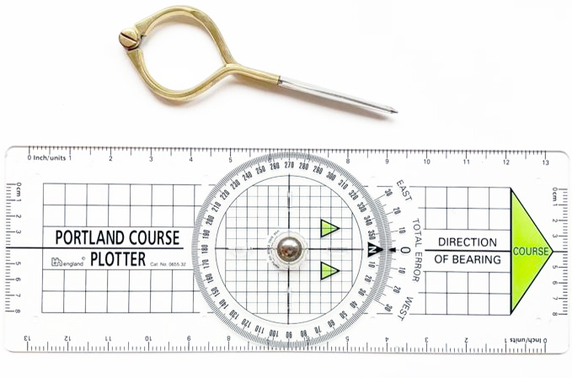
Plotter and divider You’ll need a course plotter and chart-dividers to complete the chartwork exercises - if you don’t already have these you can purchase a top quality set from us for £28 when you place your order.

Delivery UK delivery is free. European delivery is £20, outside Europe delivery is £40.
You can start studying immediately as many of the lessons don’t rely on the printed support materials.
This course is accessed online with no additional software required.
Lessons are accompanied by optional professional narration, and notes.
They are intuitive and easy to follow, whilst more complex subjects are accompanied by interactive animations and graphics to help you gain a full knowledge of each subject in the course syllabus.
Detailed step-by-step workings for navigational or tidal calculations make it easy for you to follow along as we show you how to plot positions, make tidal height and stream calculations, etc
You can go over these again and again, and test your knowledge with regular quizzes throughout each lesson.
At the end of each lesson there is an excercise containg similar questions to the exam, with detailed and illustrated answers sent to you immediately to confirm your progress and fully prepare you for your mock and final exams.
You can repeat entire lessons and excercises as often as you wish until you are confident that you fully understand each subject.
When you have completed the course you can request mock and then final exams.
These are assessed by our RYA Instructors and detailed feedback is provided in any areas that may require further study within the course.
If you pass the final exams you will be awarded the RYA/MCA Coastal Skipper & Yachtmaster Offshore Shorebased Course Certificate , which will be posted to you.
Additional free resits, with suitable Instructor guidance, are available if required.
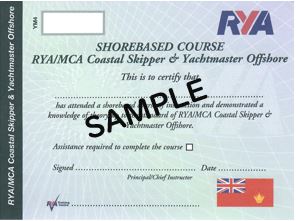
Call us for advice on 0238 218 2604
Course reviews.
Laura Anderson
Very enjoyable and informative
Impressively prompt and thorough feedback on all queries, tests, mock and real exams. Very high standards and you feel you have earned the Yachtmaster certificate.
Ciaran McIntyre
Comprehensive and well delivered
Excellent course materials and high quality delivery. Very responsive and excellent instructor feedback
Andrew Harvey
Excellent Yachtmaster theory course - I’d definitely recommend it.
Does what it says on the tin and more. I was impressed how well the course managed to tackle teaching relatively complex skills in a logical and easy to understand way.
Oliver Fleming
Well put together course.
I found the Yachtmaster theory course to be really well structured and covered all of the syllabus in great detail. I was impressed by how well the course managed to tackle teaching relatively complex skills in a logical and easy to understand way.

Combined - RYA Day Skipper & Yachtmaster to fast track your theory learning
RYA Coastal Skipper and Yachtmaster ™ Offshore Theory (Online)
- This course looks to refine the techniques learnt in your RYA Day Skipper Theory course
- International Maritime Law
- Passage Planning
- Meteorology
- Environmental care
RYA Coastal Skipper and/or Yachtmaster offshore theory is a more advanced course that builds on the knowledge gained at the RYA Day Skipper Theory level. Its aim is to take your theory knowledge to the standard required for the Yachtmaster Coastal and Yachtmaster Offshore practical course.
This course is open to anyone who has already completed Day Skipper Theory, and ideally has some practical boating experience. You should be comfortable applying concepts such as tidal heights and streams and interpreting weather information. Pilotage and passage planning will already be in your knowledge base. You will feel at ease with the practical and thorough application of the IRPCS. You will understand how to fix position using a variety of methods. Your knowledge of safety systems and practices will be substantial.
Your full training pack contents include:
- Two RYA practice charts
- The RYA Coastal / Yachtmaster course notes
- The RYA Coastal / Yachtmaster exercises
- The RYA Training Almanac
Please note: Your online course is provided by Navathome. Booking conditions are not the same as for courses delivered by Andrew Simpson Yachting.
Notes on shipping of training materials.
All training materials for the online courses are shipped to you the buyer. Please be aware of the Navathome policy relating to shipping. This forms part of their terms and conditions.
- Navathome is unable to ship to addresses which contain PO Box Numbers. A physical address is required.
- Buyers must provide a valid contact telephone number at the time of booking
- Packs being shipped to Russia must be delivered to a business address.
- All packs must be signed for, so the buyer must ensure that there will be somebody available to accept the package
- Navathome will not accept responsibility for packs sent to marinas, or c/o addresses. If the pack goes missing after it has been signed for, the buyer will be liable for the cost of the replacement pack.
Course Outcomes
- With this qualification combined with additional practical experience, you should be equipped with the knowledge required to consider the RYA Yachtmaster ™ Coastal or Yachtmaster ™ Offshore examination.

To book this course please call or email our friendly team who will set you up with everything you need to get learning. Phone: +44 (0)2392 522777 Email: [email protected]

RYA Yachtmaster Coastal/Offshore Theory
An advanced six-day navigation course, this is aimed at those who have already completed the Day Skipper theory course or are of equivalent standard. The course will give students the skills required to successfully navigate a vessel on coastal or offshore passages by day and night.
The syllabus is designed to take your theory knowledge to the standard required for sitting the Advanced CoC, Yachtmaster Coastal and Yachtmaster Offshore practical exams, concentrating on advanced navigation and meteorology skills.
Assessment includes: c hartwork a ssessment; c ollision r egulations; p assage m aking
6 day course £495pp
Given our commitment to keep prices as low as possible, in the current economic climate we reserve the right to cancel & reschedule any course which is not fully booked
Course Syllabus
Understand dead reckoning and estimated position
Understand satellite-derived position
Use of waypoints
Radar fixes
Techniques of visual fixing
Understand fixes using a mixture of position lines
Relative accuracy of different methods of position lines
Understand areas of uncertainty
The magnetic compass
Allowance for variation
Understand change of variation with time and variation
Understand causes of deviation
Swing for deviation (but not correction)
Allowance for deviation
Different types of compass
Causes of tides -spring and neaps
Tide tables - sources
Tidal levels and datum
Standard and secondary ports
Tidal anomalies
Tidal Streams
Sources of tidal information
Tidal stream information in sailing directions and yachtmen's alamanacs
Allowance for tidal stream in computing a course to steer
Tide rips, overfalls and races etc
IALA system buoyage in Region A
Limitations of buoys in navigation aids
Understand characteristics
Ranges - visual, luminous and nominal
Rising and dipping distances
Light lists
Harbour regulations and control signals
Methods of pre-planning
Clearing lines
Use of soundings
Transits and leading lines
GPS and Chart Plotters
Priniples of operation and limitations of use
Raster and vector charts
Understand datum
Importance of confirmation of position by an independent source and keeping a sperate record of position
Importance of paper charts
Echo sounders
Principles of operation and limitations of use
Logs (speed and distance measuring)
Principles of operation and limitation of use
Importance of log as yachts official document
Layout of log, hourly and occasional entries
Pre Requisites
Knowledge to the level of Day Skipper Theory
Whats Included
6 Days of Training in our Classroom
Access to our student resource website
Note Pad & Pen
Tea, Coffee & Refreshments
Yachtmaster Theory Course Pack
Training Almanac
Use of Dividers & Plotters for the course.
Course Dates
Contact us if dates are unsuitable, or no dates are showing

RYA Yachtmaster Offshore Sail – Everything You Need to Know
| Time | 8 to 48 hour exam (dependant on the number of people) after a potential prep course of up to 5 days |
| Prerequisites | 50 days spent at sea 2500nm sailed, with at least 50% in tidal waters 5 days as skipper 5 x 60nm passages, 2 of them as skipper |
| Min. Age | 18 |
| Exam | 8 hours to 2 days on the water |
| Aim | To work commercially on a sailing vessel under 24m in length within 150nm of a harbour. |
The RYA Yachtmaster Offshore Sail ticket is considered the most useful and credible of all sail cruising qualifications. Administered on behalf of the UK Maritime and Coastgaurd Agency by the RYA the qualification is accepted as a worldwide standard. To gain an RYA Yachtmaster Offshore Sail qualification you must sit a practical exam.
What Does the RYA Yachtmaster Offshore Sail Allow You to Do?
Gaining an RYA Yachtmaster Offshore Sail will allow you to work commercially on sailing vessels not exceeding 200GT.
The RYA Yachtmaster Offshore Sail exam certifies that you are competent to skipper a cruising yacht on any passage that is not more than 150nm from a harbour.
How Can You Sit an RYA Yachtmaster Offshore Sail Exam?
The exam can be organised via the RYA to be done on your own vessel or via an RYA training centre, to be done on an RYA training vessel. It should be noted, that to complete the exam on your own vessel, your vessel must be up to an appropriate safety standard.
Most RYA training centres offering the RYA Cruising Scheme offer some form of pre exam preparation or coaching for those looking to take an RYA Yachtmaster Offshore Sail exam.
These courses are often referred to as ‘RYA Yachtmaster Prep’ courses. This is unique within the RYA training framework in that it does not have a fixed course syllabus, length or course completion certificate.
Who Can Do an RYA Yachtmaster Offshore Sail Exam?
The RYA Yachtmaster Offshore Sail exam is open to anyone who meets the minimum criteria, with all experience within the last 10 years.
- 18 years of age or older
- 50 days spent at sea
- 2500nm sailed, with at least 50% in tidal waters
- 5 days as skipper
- 5 passages of over 60nm, with at least 2 as skipper
If you have skippering experience but not the required days or passages, then the RYA Yachtmaster Coastal Sail might be for you.
If you have the miles, but not the skippering experience, then again, the RYA Yachtmaster Coastal Sail might be for you.
Additionally, exam candidates must also hold a relevant GMDSS VHF certification and an RYA First Aid certificate or recognised equivalent.
Can You Go Straight to the Exam?
You can indeed jump straight into the RYA Cruising Scheme at this stage, however, it is imperative that you understand the levels that are required of you, both in your knowledge and practical skills.
It is suggested that as a minimum you have completed (and passed) the RYA Coastal Skipper and Yachtmaster Theory course as the knowledge in here is both required for you to be at the level required, but will be formally tested during your RYA Yachtmaster Offshore Sail exam, both orally and in practical applications.
What Do You Need to Know before Attending an RYA Yachtmaster Offshore Sail Course and Exam?
You, of course, need to be a suitably experienced skipper and this involves meeting the prerequisites mentioned above to be eligible. You should be able to handle your vessel competently in close quarters and at sea. You should be comfortable applying this in various day and night time passages.
As mentioned, it is strongly recommended to have completed the RYA Coastal and Yachtmaster Theory as the depth of knowledge gained from this shore based course will be tested throughout your exam.
How Long Does a Prep Course and Exam Take?
The exam itself can take anything from 8 hours to 2 days depending on how many candidates are being examined on one vessel at a time. Up to 4 candidates can sit the exam at once and this would last for a maximum of 48 hours if so.
An RYA Yachtmaster Prep course is generally four and a half days long and is usually directly followed by the practical exam.
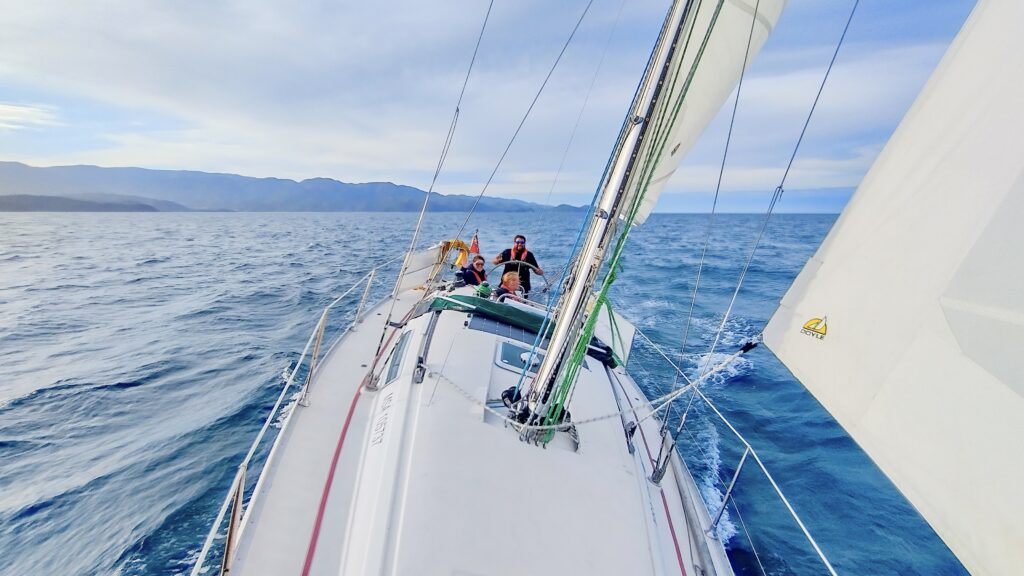
Is There a Set Syllabus for the Prep Course?
No, this is the one time that while there is a recognised ‘course’, there is no syllabus. It is up to the experienced instructor on the RYA Yachtmaster Offshore Sail Prep course to tailor the learnings to your needs. This is more about refining your skills rather than teaching new ones.
You should be honest with yourself and your instructor in order for learnings throughout the week to be tailored to improve yourself on any weak areas that you may have.
What Should I Expect from an RYA Yachtmaster Offshore Sail Prep Course?
These courses run as a standalone course and while there may be students on another course, generally everyone onboard is a candidate for an RYA Yachtmaster Exam. The courses should however be run with no more than 4 students on board.
The content will depend on the needs of all students and is aimed at fine-tuning existing skills rather than teaching new ones. This will involve a lot of night time sailing and navigation, carrying out challenging boat handling while using theory knowledge and ensuring general skippering skills are up to scratch.
There is a basic syllabus that is used to help shape the exam content, but in reality, you can be tested on anything from the RYA Cruising Scheme within the exam.
Before choosing the RYA Yachtmaster Offshore Sail Prep course you need to be honest with yourself and your own abilities. While on the course you need to take on the advice and guidance given by the instructor on what areas need work. If you speak to your instructor before the course, they can tailor the instruction to your needs.
What Should I Expect on an RYA Yachtmaster Offshore Sail Exam?
On the exam, you will be given the opportunity to demonstrate your knowledge and competence. You will be expected to take full responsibility of your vessel and crew. The examiner will be looking for you to demonstrate competence and show your broad range of experience.
The exam will be an intensive experience and even when you are not the designated skipper, you will still be asked questions and observed and examined as a participant of the crew.
During the exam you will be asked to complete various tasks, ranging from leaving the dock, skippering a short passage, casualty recovery, night pilotage and even blind navigation. Additionally, you will be tested on theoretical aspects such as how to deal with an engine failure, knowledge of your vessel’s stability, meteorology and IRPCS.
As a potential RYA Yachtmaster Offshore Sail, these tasks are ones that should now be second nature to you and should take minimal time to plan while the theoretical knowledge should be able to roll off your tongue.
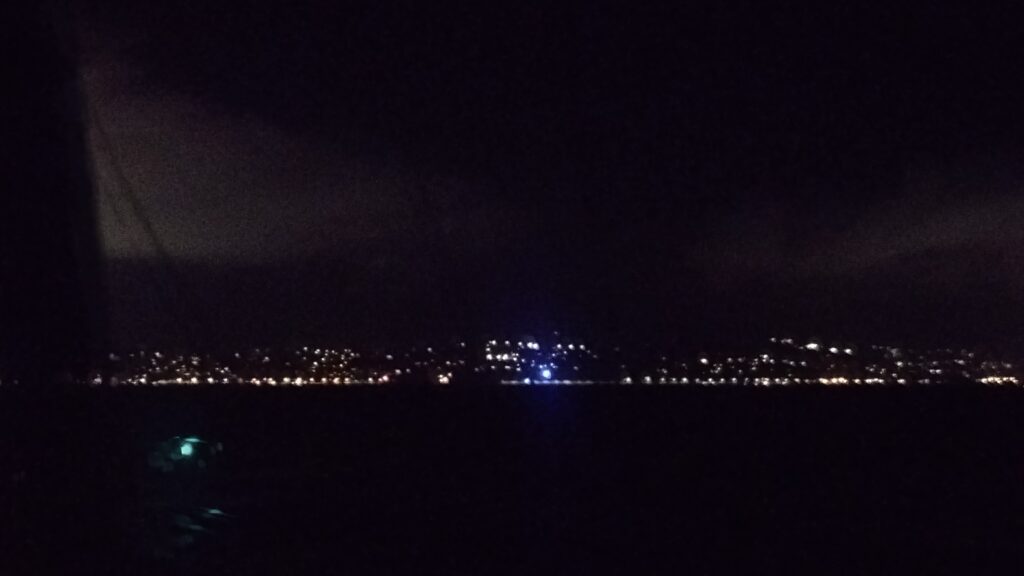

What Is the RYA Yachtmaster Offshore Sail Exam Syllabus?
The following topics make up the basis for the RYA Yachtmaster Offshore Sail exam syllabus. IRPCS, safety, boat handling, seamanship, responsibility as skipper, navigation, meteorology and signals.
But, as mentioned above, anything from the whole RYA cruising syllabus scheme can be tested.
What Is the Cost of an RYA Yachtmaster Offshore Sail Course and Exam?
As ever, many schools differ in price. We would recommend that you take a look around at the various options and find what suits your needs the best. Cheapest is not often better.
This can range from knowing if you will have to share a cabin while onboard to whether food and berthing charges are included to how many other students you will be sharing your week with.
The exam fee is usually not included, which is currently £231.
Where Should I Do My RYA Yachtmaster Offshore Sail?
As always there are many thoughts and pros on cons on this, and as a potential RYA Yachtmaster Offshore Sail you should consider yourself experienced enough to sit the exam anywhere. However, if you choose to sit the exam in an area that you are familiar with then you will take a little bit of the stress out of learning a new area and start with a small advantage of having that all important local knowledge at your disposal.
What Happens If I Struggle on the Prep Course?
Your instructor should be able to update you on your ability levels throughout the course. They will be highly experienced and it is suggested that you listen to their advice given.
If you are learning something for the first time you should consider if you are ready for the exam. Talk to your instructor and they will be able to guide you on if you are ready for the exam, if they would advise further training or if they recommend that you aim for the RYA Yachtmaster Coastal Sail exam instead.
What Is the Pass Mark for the RYA Yachtmaster Offshore Sail Exam?
There is no pass mark as such and the examiner will be looking to see that you are a competent and complete skipper, capable of looking after both your vessel and crew in a safe manner.
Every exam is different and no examiner will be setting out to fail any candidates, but they must ensure and check that each candidate is able to demonstrate their ability, knowledge and skills in a safe and timely manner.
If you were to fail to reach the levels of an RYA Yachtmaster Offshore Sail certificate of competence then the examiner will give you a thorough debrief complete with action points to work on before you have another attempt at the exam.
What Comes after RYA Yachtmaster Offshore Sail
After completion of the exam, you will have gained the highly sought after RYA Yachtmaster Offshore Sail certificate of competence and you can get this commercially endorsed by adding a sea survival certification, a personal medical and a PPR course, all of which, along with your GMDSS VHF and First Aid should be sent off to the RYA for certification upgrade. This will now allow the holder to skipper a vessel commercially, so long as it is less than 200 gross tonnes, up to 150nm from a harbour.
The next step is of course to get out on the water and to keep learning, keep gaining experience and keep improving on the skills and knowledge learned so far. No skipper is the finished article and we should all keep seeking to improve.
Within the RYA cruising scheme, there are a couple more steps that are possible. This is to progress and upgrade your RYA Yachtmaster Offshore Sail certificate of competence to an RYA Yachtmaster Ocean Sail certificate of competence.
To do this there is 3 main steps, first, you will need to complete an RYA Yachtmaster Ocean Theory course, where you will learn about astro navigation, ocean meteorology and ocean navigation, join the waiting list for our ocean theory course here . Next, is to complete an ocean qualifying passage that meets the necessary requirements. Finally, you will then need to complete another exam, this time an oral exam, where you will discuss your ocean qualifying passage and general ocean skippering skills.
On successful completion of this, you will be awarded the highest accolade within the RYA cruising scheme, the RYA Yachtmaster Ocean Sail certificate of competence.
One other direction of travel is to become an RYA Cruising Instructor for Sail. To do this, you will first want to consolidate your skippering skills and knowledge then look to come back and start off with an RYA Cruising Instructor course. On this course, RYA Instructor Trainers will assess and guide you through what is required and expected in order to work as an RYA Cruising Instructor for Sail.
Releated Posts
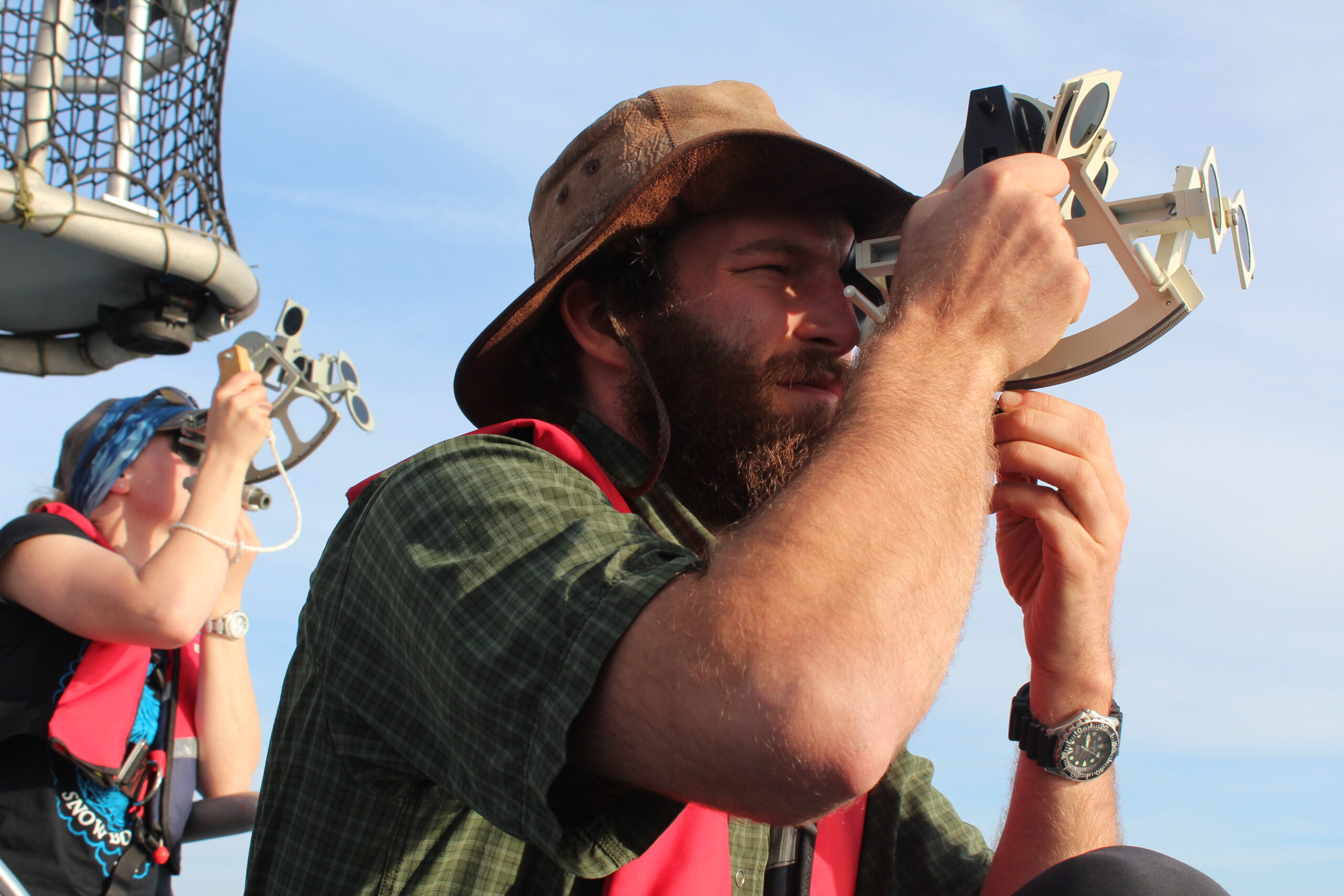
RYA Yachtmaster Ocean Theory – Everything You Need to Know
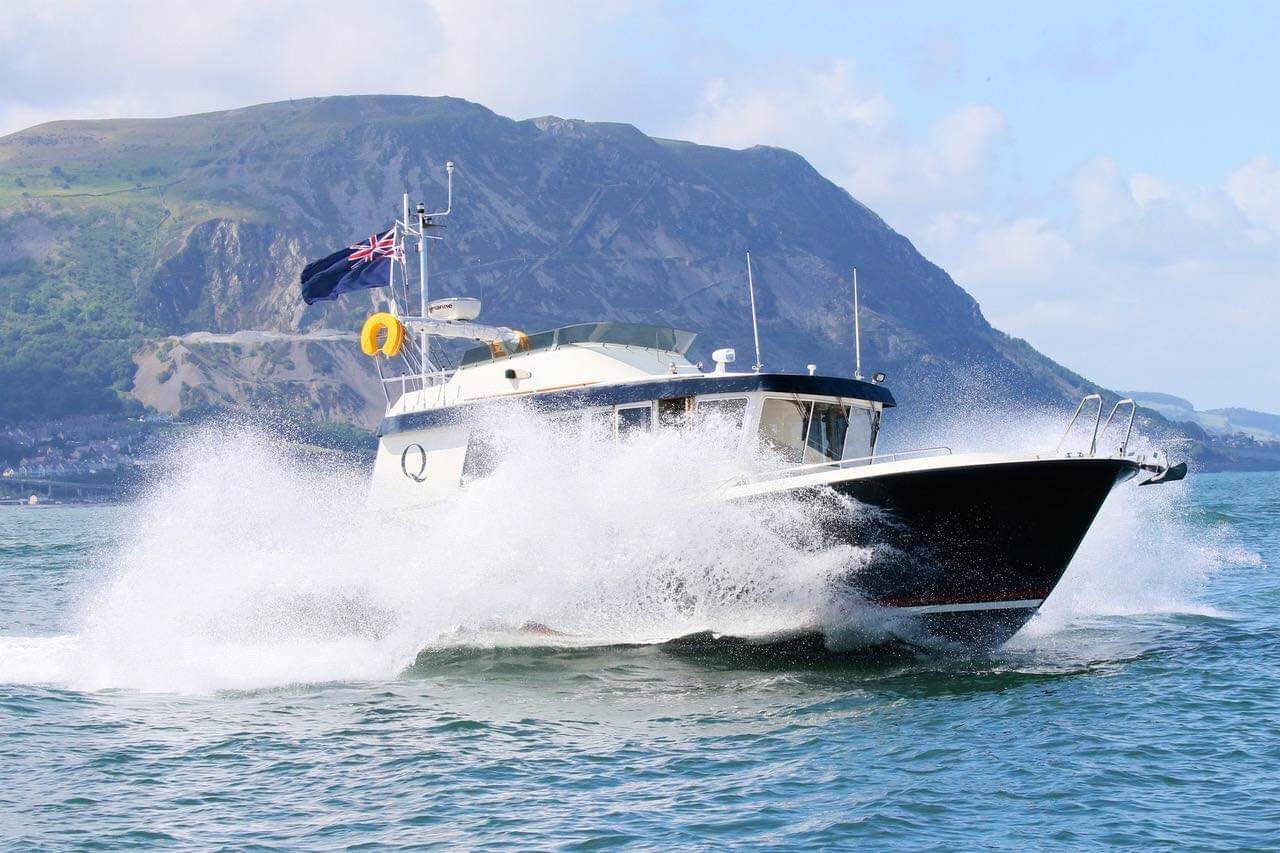
RYA Yachtmaster Offshore Motor – Everything You Need to Know
Your Comment*
Save my name, email, and website in this browser for the next time I comment.
- Certificates of Competence
- RYA Yachtmaster Offshore exam
RYA Yachtmaster Offshore Exam
Full details of the exam syllabus and requirements are shown in the RYA Yachtmaster Scheme Syllabus and Logbook (G158) available from the webshop (see right).
RYA Yachtmaster Offshore practical exams can be taken under sail or power and your certificate will be endorsed accordingly. The candidate or a training centre provides the boat and the RYA provides an examiner. Note: All qualifying sea time and passages must be gained on vessels appropriate to the type of exam i.e. gained in sailing vessels for a sail exam and power vessels for a power exam.
There is no formal training course leading up to the exam, but those who have not previously taken RYA courses often find it useful to book themselves in for some informal training at an RYA centre prior to their exam. This training can be tailor-made to your specific needs and helps to fill any gaps in your knowledge that may become apparent.
The exam will include an assessment of your skippering skills, boat handling, general seamanship, navigation, safety awareness and knowledge of the IRPCS, meteorology and signals.
| Documented minimum sea time completed on a seagoing sailing or motor yacht (as appropriate) in the last 10 years: which may be reduced to 25 days if the candidate already holds an RYA Yachtmaster Offshore Certificate of Competence ; ; , which may be reduced to 1250 miles if the candidate already holds an RYA Yachtmaster Offshore Certificate of Competence if the candidate already holds an RYA Yachtmaster Offshore Certificate of Competence
At least half the qualifying sea time should be gained in tidal waters and on vessels less than 24m LOA, and all seatime must be on vessels of the same discipline as the exam to be taken, i.e. sail or power. Contact if your sea time is on a yacht greater than 24m and 500gt. For example, an RYA Yachtmaster Offshore Sail wishing to be examined for RYA Yachtmaster Offshore Power | |
| Practical | |
| . | |
| | 8-12 hours for 1 candidate, 10-18 hours for 2 candidates.No more than two candidates can be examined in 24 hours and no more than four candidates can be examined in one 2 day session. |
| 18 at the time of the exam |
Boats used for exams
You may use your own boat or a boat that you have chartered or borrowed. You will be responsible for ensuring the boat is seaworthy and suitable for the area in which the exam takes place and equipped as shown below.
The boat used must be between 7m and 18m (LOA) and be in sound, seaworthy condition, equipped to the standard set out in the RYA Boat Safety Handbook 2nd Edition (code G103). The boat must be equipped with a full up to date set of charts and navigational publications along with working instruments and either plotter or GPS. In addition to the candidate there should be two crew on board as the examiner will not take part in the management of the boat during the exam.
There may be vessels that will meet the guidelines outlined above but by virtue of their layout, construction, handling characteristics or other factors may be unsuitable for use for an RYA Yachtmaster Practical examination. The RYA reserves the right to refuse an exam on a vessel that, in the view of the RYA Chief Examiner, will not allow the examiner to conduct an examination to the standard required by the RYA/MCA Yachtmaster Qualification Panel.
Before you book your exam please check that you:
- can provide a boat
- have completed the required mileage and experience as skipper
- hold an SRC (Short Range Certificate) or higher level GMDSS radio operators qualification
- hold a valid first aid certificate
- have read the syllabus in RYA Logbook (G158)
- have read and comply with the pre-requisites above.
Additionally if not on the boat, you will need to bring to the exam:
- laminated or waterproof charts
- GPS set (may be hand held)
- tide tables
- pilotage information for the local area, eg pilot books, port information etc
- plotting instruments.
- Photographic ID card or document, such as a passport or driving licence
If you need your Certificate of Competence in order to work on board a commercial craft subject the MCA's codes of practice, you will need to get it commercially endorsed .
Useful links
Arranging your exam, commercial endorsements, exam payments service, mca manning requirements, professional qualifications.
Special Offers | | |
- Training Info
- RYA Theory Syllabi
- RYA Coastal Skipper & Yachtmaster Offshore Theory Syllabus
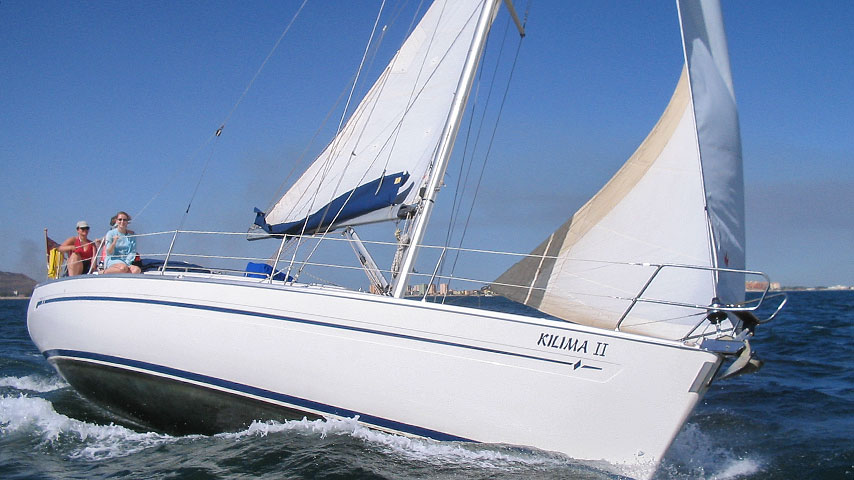
Written by Endeavour Sailing on 01 June 2016 .
RYA Coastal Skipper and Yachtmaster Offshore Theory Syllabus
The RYA Coastal Skipper / Yachtsmaster Offshore Theory is an advanced course in navigation, meteorology and Collision Regulations for candidates wishing to do the RYA Coastal Skipper course or the Yachtmaster Coastal and Yachtmaster Offshore Preparation weeks.
Pre Course Knowledge
- Assumed knowledge to the level of RYA Day Skipper Theory – this course will allow some time for revision of the day skipper theory but if you do not have this knowledge you are unlikely to be able to assimilate all the information covered in this course in the time available
Course Syllabus
1. position.
- Dead Reckoning and Estimated Position
- Satellite derived position
- Use of waypoints to fix position
- Radar fixes
- Techniques of visual fixing
- Fixes using a mixture of position lines
- Relative accuracy of different methods of position fixing
- Areas of uncertainty
2. The Magnetic Compass
- Allowance for variation
- Change of variation with time and position
- Causes of deviation
- Compass checks for deviation, but not correction
- Allowance for deviation
- Different types of compass
3. Tides
- Causes of tides – springs and neaps
- Tide tables –sources
- Tidal levels and datum
- Standard and secondary ports
- Tidal anomalies (Solent etc.)
4. Tidal Streams
- Sources of tidal information
- Tidal stream information in sailing directions and yachtsmen’s almanacs
- Allowance for tidal streams in computing a course to steer
- Tide rips, overfalls and races
- Tidal observation buoys, beacons etc.
5. Buoyage
- IALA system buoyage in Regions A and B
- Limitations of buoys as navigational aids
6. Lights
- Characteristics
- Ranges – visual, luminous and nominal
- Rising and dipping distances
- Light lists
7. Pilotage
- Harbour regulations and control signals
- Methods of pre-planning
- Clearing lines
- Use of soundings
- Transits and leading lines
8. GNSS and Chart Plotters
- Principles of operation and limitations of use
- Raster and vector charts
- The importance of secondary means of position fixing via an independent source and keeping a separate record of position
- The importance of paper charts
9. Echo Sounders
10. logs (speed and distance measuring), 11. deck log.
- The importance of the log as a yacht’s official document
- Layout of log, hourly and occasional entries
12. Meteorology
- Basic terms, the Beaufort Scale
- Cloud types
- Weather patterns associated with pressure and frontal systems
- Sources of weather forecasts
- Ability to interpret a shipping forecast, weather fax and weather satellite information
- Land and sea breezes
- Use of a barometer as a forecasting aid
13. Rules of the Road
- A sound knowledge of the International Regulations for Preventing Collisions at Sea, except Annexes 1 and 3
14. Safety at Sea
- Personal safety, use of life jackets, safety harnesses and life lines
- Fire prevention and firefighting
- Distress signals
- Coastguard and Boat Safety Scheme
- Preparation for heavy weather
- Life rafts and helicopter rescue
- Understanding of capabilities of vessel and basic knowledge of stability
15. Navigation in Restricted Visibility
- Precautions to be taken in fog
- Limitations to safe navigation imposed by fog
- Navigation strategy in poor visibility
16. Passage Planning
- Preparation of charts and notebook for route planning and for use on passage at sea
- Customs regulations as they apply to yachts
- Routine for navigating in coastal waters
- Strategy for course laying
- Use of and visual confirmation of waypoints and routes
- Use of weather forecast information for passage planning strategy
- Sources of local and national regulations
17. Marine Environment
- The responsibility to minimise pollution and protect the marine environment
Get in touch
Office hours.
Mo - Fr 9.30 - 16.30 Sa 10.00 - 14.00
Out of office contact
Mobile 0034 628 478 400
Edifico Antiguo Varadero Bloque D No 15 - 2nd Planta 35571 Puerto Calero Marina Lanzarote - Canary Islands
>> Get directions using Google Maps
Email [email protected] Phone 0034 928 849 670 Mobile 0034 628 478 400
- Find your Sailing Course
- RYA Practical Sailing Courses
- Classroom Courses
- Online Theory Courses
- Online “Zoom” Training
- RYA Fast Track Courses
- RYA One Day Courses
- Development Courses
- RYA Motor Courses
- Glossary of Sailing Terms
- VHF Radio Courses
- Pre Course Reading
- Knots (video tutorials)
- International Regulations for Preventing Collisions at Sea
- Marine Environment
- Navigation (video tutorials)
- RYA Practical Syllabi
- RYA One Day Courses Syllabi
We use cookies on our website. Some of them are essential for the operation of the site, while others help us to improve this site and the user experience (tracking cookies). You can decide for yourself whether you want to allow cookies or not. Please note that if you reject them, you may not be able to use all the functionalities of the site.

Yachtmaster Offshore Exam Syllabus
1. International Regulations for Preventing Collisions at Sea Questions will be confined to the International Regulations and although candidates must be aware of the existence of Local Regulations, they will not be expected to memorise specific local regulations.
- General rules (1-3)
- Steering and sailing rules (4-19)
- Lights and shapes (20-31)
- Sound and light signals (32-37)
- Signals for vessels fishing in close proximity (Annex II) D
- istress signals (Annex IV)
2. Safety Candidates will be expected to know what safety equipment should be carried on board a yacht, based either on the recommendations in the RYA Boat Safety Handbook (C8), the ISAF Special Regulations or the Codes of Practice for the safety of Small Commercial Vessels. In particular, candidates must know the responsibilities of a skipper in relation:
- Safety harnesses
- Lifejackets
- Distress flares
- Fire prevention and fighting
- Liferafts Knowledge of rescue procedures
- Helicopter rescue
3. Boat Handling Candidates for Coastal Skipper examinations will be expected to answer questions or demonstrate ability in simple situations only. Candidates for Yachtmaster Offshore will be expected to answer questions or demonstrate ability in more complex situations and will also be expected to show a higher level of expertise: Coming to and weighing anchor under power or sail in various conditions of wind and tide All berthing and unberthing situations in various conditions of wind and tide Recovery of man overboard Towing under open sea conditions and in confined areas Boat handling in confined areas under sail Boat handling in heavy weather Helmsmanship and sail trim to sail to best advantage Use of warps for securing in an alongside berth and for shifting berth or winding
4. General Seamanship, including maintenance
- Properties, use and care of synthetic fibre ropes
- Knots
- General deck-work at sea and in harbour
- Engine operations and routine checks
- Improvisation of jury rigs following gear failure
5. Responsibilities of skipper
- Can skipper a yacht and manage the crew
- Communication with crew
- Delegation of responsibility and watch-keeping organisation
- Preparing yacht for sea and for adverse weather
- Tactics for heavy weather and restricted visibility
- Emergency and distress situations
- Victualling for a cruise and feeding at sea
- Customs procedures
- Standards of behaviour and courtesy
6. Navigation
- Charts, navigational publications and sources of navigational information
- Chartwork including position fixing and shaping course to allow for tidal stream and leeway
- Tide and tidal stream calculations
- Buoyage and visual aids to navigation
- Instruments including compasses, logs, echo sounders, radio navaids and chartwork instruments
- Passage planning and navigational tactics
- Pilotage techniques
- Navigational records
- Limits of navigational accuracy and margins if safety
- Lee shore dangers
- Use of electronic navigation aids for passage planning and passage navigation
- Use of waypoints and electronic routeing
7. Meteorology
- Definition of terms
- Sources of weather forecasts
- Weather systems and local weather effects
- Interpretation of weather forecasts, barometric trends and visible phenomena
- Ability to make passage planning decisions based on forecast information
8. Signals
- Candidates for Yachtmaster Offshore and Coastal Skipper must hold the Restricted (VHF only) Certificate of Competence in radiotelephony or a higher grade of certificate in radio telephony.

RYA YACHTMASTER THEORY
6 days of expert tuition from europe’s leading adventure sailing school, introduction.
The RYA Yachtmaster theory course teaches you the skills you need to pass your Yachtmaster Coastal or Yachtmaster Offshore certificate. It is a pre-requisite to taking the practical exams that you have passed this course. While not obligatory, it is also highly recommended that you have taken this course before taking the Coastal Skipper course.
Previous experience required
6 days (Mon - Sat)
Ría de Vigo, NW Spain. Based in Monte Real Club Yates Baiona.
- Day Skipper theory required
- Classroom based
- More advanced navigational skills
- Required skills to pass Yachtmaster
- All course materials including course notes.
- Morning and afternoon tea.
What’s not Included
- Overnight accommodation
All teaching is in a classroom, led by an expert JVN instructor. Class sizes are limited to 8 students, to ensure that you have proper levels of interaction with the instructor. Students come with all different levels of prior knowledge, but do not worry. The entire syllabus is taught from the beginning, and no knowledge of the syllabus is expected prior to starting
Quality of the instructors
The simple truth is that shore based courses in the sailing industry are often taught by people who have done very little sailing outside of their local area. This hugely limits their skills and experience, beyond repeating the same anecdotes and lines lesson after lesson.
We are constantly learning, evolving and improving our approach to sailing and navigation. When you learn with us, you will be getting expert instructors teaching the latest approaches to the theory.
- Dead reckoning and estimated position
- Satellite-derived position
- Use of waypoints to fix position
- Radar fixes
- Techniques of visual fixing
- Fixes using a mixture of position lines
- Relative accuracy of different methods of position fixing
- Area of uncertainty
- Allowance for variation
- Change of variation with time and position
- Causes of deviation
- Swing for deviation (but not correction)
- Allowance for deviation
- Different types of compass
- Causes of tide – Springs and Neaps
- Tide tables – sources
- Tidal levels and datum
- Standard and secondary ports
- Tide anomalies (Solent, etc.)
- Sources of tidal information
- Tidal stream information in sailing directions and Yachtsmen’s Almanacs
- Allowance for tidal streams in computing a course to steer
- Tide rips, overfalls and races
- Tidal observation buoys, beacons etc.
- IALA system buoyage in Region A
- Limitations of buoys as navigational aids
- Characteristics
- Ranges – visual, luminous and nominal
- Rising and dipping distances
- Light lists
- Harbour regulations and control signals
- Methods of pre-planning
- Clearing lines
- Use of soundings
- Transits and leading lines
- Principles of operation and limitations of use
- Raster and vector charts
- Importance of confirmation of position by an independent source and keeping a separate record of position
- Importance of paper charts
- Principles of operation limitations of use
- Importance of log as yacht’s official document
- Layout of log, hourly and occasional entries
- Basic terms, the Beaufort scale b. Air masses c. Cloud types d. Weather patterns associated with pressure and frontal systems e. Sources of weather forecasts f. Ability to interpret a shipping forecast, weather fax and weather satellite information g. Land and sea breezes h. Sea fog i. Use of barometer as a forecasting aid
- A sound knowledge of the International Regulations for Preventing Collisions at Sea, except Annexes 1 and 3
- Personal safety, use of lifejackets, safety harnesses and lifelines
- Fire prevention and fire fighting
- Distress signals
- Coastguard and Boat Safety Scheme
- Preparation for heavy weather
- Liferafts and helicopter rescue
- Understanding of capabilities of vessel and basic knowledge of stability
- Precautions to be taken in fog
- Limitations to safe navigation imposed by fog
- Navigation in poor visibility
- Preparation of charts and notebook for route planning and making, and use at sea
- Customs regulations as they apply to yachts
- Routine for navigating in coastal waters
- Strategy for course laying
- Use of waypoints and routes
- Use of weather forecast information for passage planning strategy
- Sources of local and national regulations
ARE YOU INTERESTED IN ANY OF OUR COURSES?
Frequent asked questions, in order to provide you with all the information that we can offer you, you can find in this section the answers to the most frequently asked questions., what time does my sailing course start and finish.
Start: 0900hrs on Monday
Finish: 1600hrs on Saturday
Do I need to book overnight accommodation?
Yes, unless you live nearby. These are not residential courses.
Is everything else I need included?
Yes. Your course comes with all the course notes you will need. You do not need to bring any other equipment. It is all provided.
Privacy Overview

RYA Yachtmaster Ocean Theory – Syllabus
Yachtmaster ocean theory syllabus.
This is a course in astro-navigation and worldwide meteorology which also reveals the mysteries of the sextant. It assumes you already have a knowledge of all subjects covered in introductory course Day Skipper Shorebased Course and the more advanced RYA Yachtmaster Offshore theory syllabus. If you are not sure you can check the content of the more advanced Yachtmaster Offshore here:
Pre Requisite Knowledge – RYA Yachtmaster Offshore Theory Syllabus
1. The earth and the celestial sphere
Definition of observer’s zenith and position of a heavenly body in terms of latitude, longitude, GHA and declination Right angle relationships, latitude and co-lat, declination and polar distance Relationship between GHA, longitude and LHA Tabulation of declination in nautical almanac Rate of increase of hour angle with time
2. The PZX triangle
The tabulated components of the triangle, LHA, co-lat and polar distance The calculable components, zenith distance and azimuth Relationship between zenith distance and altitude Introduction to the tabular method of solution in the Air Navigation Tables and the basic sight form The use of calculators for the solution of the PZX triangle
3. The sextant
Practical guide to the use and care of a sextant at sea Conversion of sextant altitude to true altitude Application of dip, index error and refraction Correction of side error, perpendicularity, index error and collimation error
4. Measurement of time
Definition of, and relationship between, UT, LMT, standard time and zone time Rating of chronometers and watches
5. Meridian altitudes
Forecasting time of meridian altitude Reduction of meridian altitude sights
6. Sun, star and other sights
Reduction and plotting of sun sights using Air Navigation Tables Awareness of use of calculator for sight reduction The plotting of sun-run-sun meridian altitude Awareness of the reduction and plotting of sights obtained from stars, moon and planets
7. Compass checking
Use of amplitude and azimuth tables systems and/or calculator
8. Satellite Navigation Systems
Principles and limitations of use of all systems
9. Great circle sailing
Comparison of rhumb lines and great circles Vertices and composite tracks The computation of a series of rhumb lines approximating to a great circle by use of gnomonic and Mercator projections
10. Meteorology
General pressure distribution and prevailing winds over the oceans of the world Tropical revolving storms, seasonal occurrence and forecasting by observation
11. Passage planning
Publications available to assist with planning of long passages (routeing charts, ocean passages of the world and other publications) Preparation for ocean passage including survival equipment, victualling, water and fuel management, chafe protection, spares and maintenance
12. Passage making
Navigational routine Watchkeeping Crew management
13. Communications
Satellite and terrestrial systems Weather information
***** Book Now – Special Offer – RYA Theory Course *****
Blog search.
Latest Posts
09/05 Inspiration
Top Tips for Your First Traditional Sailing Holiday
08/29 Careers
Writing Your Sailing CV
08/11 Announcing New Voyages
Skippers Logbook: Fetes Maritimes Brest 2024
RYA Yachtmaster Coastal and Yachtmaster Offshore Theory – Syllabus
To coil or not to Coil!! that is the question
More Stories
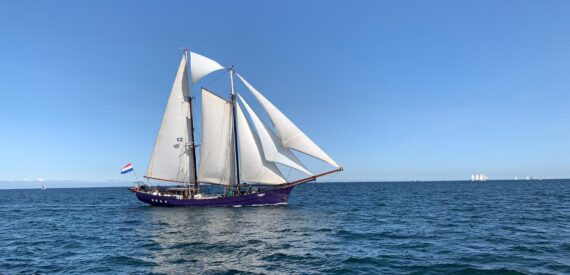
05/09 Inspiration
No Experience Required Ready to Sail? If you’re thinking about trying traditional sailing, no experience is necessary. Whether you’re a complete beginner or a
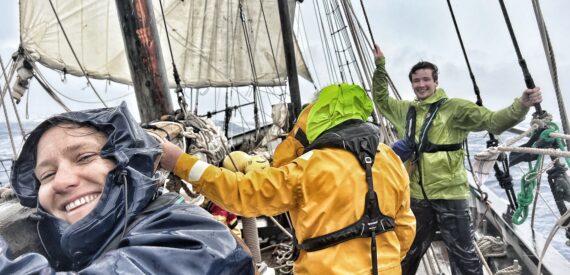
29/08 Careers
Get Noticed for Your Next Volunteering or Crewing Role Having been involved with the management of various ships, as well as volunteer and trainee
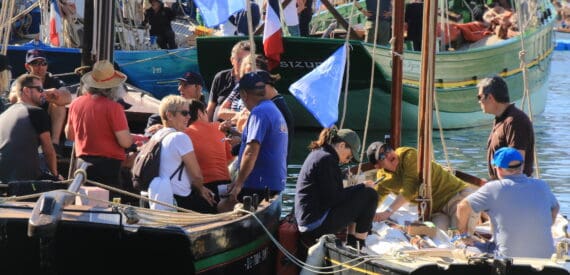
11/08 Announcing New Voyages
Tallulah’s skipper Debbie Purser reports back on Brest Festival of the Sea 2024 Anarchic behaviour out of the water, and sometimes like a sea

- Start Yachting
- Competent Crew
- Dayskipper Practical
- Dayskipper All in one
- Coastal Skipper
- Yachtmaster Offshore Preparation
- Milebuilding Cruises
- The ICC (International Certificate of Competency)
- Professional Yachtmaster Offshore Commercial Training Programme
- 1:1 Tuition
- Sailing Trips
- Own Boat Tuition
- Dayskipper Theory
- Online Dayskipper Theory
- Yachtmaster Theory
- Online Yachtmaster Theory
- Online VHF Course
- Sea Survival
- ISAF Offshore Safety
- 2024 Round Ireland Yacht Race
- The 2023 Rolex Fastnet Race Expedition
- Corporate Yacht Racing Club
- Exciting Yacht Racing
- Relaxed Yacht Cruising
- Yacht Charter
- Booking Form
Yachtmaster Offshore Exam Syllabus
Candidates may be given the opportunity to demonstrate knowledge of competence in the areas listed below. In each section the examiner will expect to see the candidate take full responsibility for the management of the yacht and crew. In Yachtmaster Offshore exams the candidate will be expected to demonstrate competence based on broad experience.
1. International Regulations for Preventing Collisions at Sea Questions will be confined to the International Regulations and although candidates must be aware of the existence of Local Regulations, they will not be expected to memorise specific local regulations. General rules (1-3) Steering and sailing rules (4-19) Lights and shapes (20-31) Sound and light signals (32-37) Signals for vessels fishing in close proximity (Annex II) Distress signals (Annex IV) 2. Safety Candidates will be expected to know what safety equipment should be carried on board a yacht, based either on the recommendations in the RYA Boat Safety Handbook (C8), the ISAF Special Regulations or the Codes of Practice for the safety of Small Commercial Vessels. In particular, candidates must know the responsibilities of a skipper in relation: Safety harnesses Lifejackets Distress flares Fire prevention and fighting Liferafts Knowledge of rescue procedures Helicopter rescue
3. Boat Handling Candidates for Coastal Skipper examinations will be expected to answer questions or demonstrate ability in simple situations only. Candidates for Yachtmaster Offshore will be expected to answer questions or demonstrate ability in more complex situations and will also be expected to show a higher level of expertise: Coming to and weighing anchor under power or sail in various conditions of wind and tide All berthing and unberthing situations in various conditions of wind and tide Recovery of man overboard Towing under open sea conditions and in confined areas Boat handling in confined areas under sail Boat handling in heavy weather Helmsmanship and sail trim to sail to best advantage Use of warps for securing in an alongside berth and for shifting berth or winding 4. General Seamanship, including maintenance Properties, use and care of synthetic fibre ropes Knots General deck-work at sea and in harbour Engine operations and routine checks Improvisation of jury rigs following gear failure 5. Responsibilities of skipper Can skipper a yacht and manage the crew Communication with crew Delegation of responsibility and watch-keeping organisation Preparing yacht for sea and for adverse weather Tactics for heavy weather and restricted visibility Emergency and distress situations Victualling for a cruise and feeding at sea Customs procedures Standards of behaviour and courtesy 6. Navigation Charts, navigational publications and sources of navigational information Chartwork including position fixing and shaping course to allow for tidal stream and leeway Tide and tidal stream calculations Buoyage and visual aids to navigation Instruments including compasses, logs, echo sounders, radio navaids and chartwork instruments Passage planning and navigational tactics Pilotage techniques Navigational records Limits of navigational accuracy and margins if safety Lee shore dangers Use of electronic navigation aids for passage planning and passage navigation Use of waypoints and electronic routeing 7. Meteorology Definition of terms Sources of weather forecasts Weather systems and local weather effects Interpretation of weather forecasts, barometric trends and visible phenomena Ability to make passage planning decisions based on forecast information 8. Signals Candidates for Yachtmaster Offshore and Coastal Skipper must hold the Restricted (VHF only) Certificate of Competence in radiotelephony or a higher grade of certificate in radio telephony.
Candidates must also hold a valid first aid certificate from a specific list of approved first aid certificates by the RYA. Most first aid certificates are valid for 3 years.
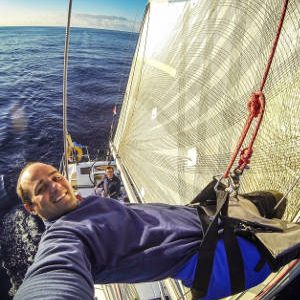
- Full Terms and Conditions

IMAGES
VIDEO
COMMENTS
RYA Yachtmaster Offshore exam pre-requisites. 5 passages over 60 miles long, which must include 2 overnight passages and 2 as skipper, which may be reduced to 3 passages including 1 overnight and 1 as skipper if the candidate already holds an RYA Yachtmaster Offshore Certificate of Competence 3. 1 At least half the qualifying sea time should be ...
This is an advanced course in navigation and meteorology for candidates for the Coastal Skipper and RYA Yachtmaster Offshore Shorebased Certificate. The syllabus makes some provision for the revision of subjects in the Day Skipper Course, but those who have not acquired the knowledge set out in the Day Skipper Course are unlikely to be able to ...
Coastal Skipper/Yachtmaster Offshore Theory Course Ideal for candidates for the Coastal Skipper practical course & Yachmaster Offshore exam. Some revision of the Day Skipper shorebased course plus more advanced skills in offshore & coastal navigation by day & night, pilotage & meteorology.
Yachtmaster Offshore Theory Syllabus The RYA Coastal Skipper / Yachtsmaster Offshore Theory is an advanced course in navigation, meteorology and Collision Regulations for candidates wishing to do the RYA Coastal Skipper course or the Yachtmaster Coastal and Yachtmaster Offshore Preparation weeks. Pre Course Knowledge
While alongside, put the engine astern and have a look which side the prop wash emerges. The stern will kick to the other side when engaging astern. We checked the boat's pivot point too in ahead and astern, and how long the boat needed to get steerage in either direction. All of this can be done in open water.
The RYA Yachtmaster online theory course takes your theory knowledge to the standard required for the Yachtmaster Coastal and Yachtmaster Offshore practical exams.. This course advances your skills as a skipper of a yacht or motor boat, with an emphasis on navigation and passage planning for more complex coastal or offshore passages by day and night
RYA Coastal Skipper and/or Yachtmaster offshore theory is a more advanced course that builds on the knowledge gained at the RYA Day Skipper Theory level. Its aim is to take your theory knowledge to the standard required for the Yachtmaster Coastal and Yachtmaster Offshore practical course. This course is open to anyone who has already completed ...
The syllabus is designed to take your theory knowledge to the standard required for sitting the Advanced CoC, Yachtmaster Coastal and Yachtmaster Offshore practical exams, concentrating on advanced navigation and meteorology skills. Assessment includes: chartwork assessment; collision regulations; passage making. 6 day course £495pp.
The YachtmasterTM Offshore is competent to skipper a cruising yacht on any passage during which the yacht is no more than 150 miles from harbour. Full details of the exam syllabus and requirements are shown in the RYA Yachtmaster Scheme Syllabus and Logbook (G158) available from the webshop (see right). YachtmasterTM Offshore practical exams ...
This document outlines the syllabus for an advanced course covering navigation and meteorology skills for candidates seeking the Coastal Skipper and RYA Yachtmaster Offshore certifications. The course builds upon knowledge from the Day Skipper course and assumes that level of baseline understanding. It covers topics like position fixing, compass use, tides, buoyage, rules of the road, safety ...
To qualify for the Yachtmaster Offshore Exam, you will need to have the following: 2500 miles at sea (50% in tidal waters) 50 Days Sea Time ... Yachtmaster Shore Based Course Syllabus The Coastal / Yachtmaster theory course requires pre-course knowledge to Day Skipper level theory. Assumed knowledge includes CTS, COG, EPs, knowledge of tidal ...
In Yachtmaster Offshore exams the candidate will be expected to demonstrate competence based on broad experience. Pre-requisites to the YM Offshore exams are: Candidates must be at least 17 years old. Candidates must hold a RYA VHF Short Range Certificate or higher. Candidates must hold a valid First Aid certificates dated within 3 years of the ...
Yachtmaster Offshore Exam Syllabus. Candidates may be given the opportunity to demonstrate knowledge of competence in the areas listed below. In each section the examiner will expect to see the candidate take full responsibility for the management of the yacht and crew. In Yachtmaster Offshore exams the candidate will be expected to demonstrate ...
The RYA Yachtmaster Offshore Sail exam is open to anyone who meets the minimum criteria, with all experience within the last 10 years. 18 years of age or older. 50 days spent at sea. 2500nm sailed, with at least 50% in tidal waters. 5 days as skipper.
RYA Yachtmaster Offshore exam pre-requisites. 5 passages over 60 miles long, which must include 2 overnight passages and 2 as skipper, which may be reduced to 3 passages including 1 overnight and 1 as skipper if the candidate already holds an RYA Yachtmaster Offshore Certificate of Competence 3. 1 At least half the qualifying sea time should be ...
Yachtmaster and coastal skipper theory courses are designed to take the novice skipper further to sail longer passages and sail by night ... This is an advanced course in navigation and meteorology for candidates for the Coastal Skipper and Yachtmaster Offshore Certificate. The syllabus makes some provision for the revision of subjects in the ...
Yachtmaster Offshore shorebased course - syllabus The Coastal Skipper and Yachtmaster shorebased course is an advanced course in navigation and meteorology for candidates for the Coastal Skipper and Yachtmaster Offshore Certificate. The syllabus covers some revisions of subjects at Day Skipper level, but
Coastal Skipper/Yachtmaster Theory Syllabus. This is an advanced course in navigation and meteorology for candidates for the Coastal Skipper and Yachtmaster Offshore Certificate. The syllabus makes some provision for the revision of subjects in the Day Skipper course but those who have not acquired the knowledge set out in the Day Skipper ...
The RYA Coastal Skipper / Yachtsmaster Offshore Theory is an advanced course in navigation, meteorology and Collision Regulations for candidates wishing to do the RYA Coastal Skipper course or the Yachtmaster Coastal and Yachtmaster Offshore Preparation weeks.. Pre Course Knowledge. Assumed knowledge to the level of RYA Day Skipper Theory - this course will allow some time for revision of ...
Yachtmaster Offshore Exam Syllabus. Candidates may be given the opportunity to demonstrate knowledge of competence in the areas listed below. In each section the examiner will expect to see the candidate take full responsibility for the management of the yacht and crew. In Yachtmaster Offshore exams the candidate will be expected to demonstrate ...
Introduction. The RYA Yachtmaster theory course teaches you the skills you need to pass your Yachtmaster Coastal or Yachtmaster Offshore certificate. It is a pre-requisite to taking the practical exams that you have passed this course. While not obligatory, it is also highly recommended that you have taken this course before taking the Coastal ...
Yachtmaster Ocean Theory Syllabus. This is a course in astro-navigation and worldwide meteorology which also reveals the mysteries of the sextant. It assumes you already have a knowledge of all subjects covered in introductory course Day Skipper Shorebased Course and the more advanced RYA Yachtmaster Offshore theory syllabus.
Yachtmaster Offshore Exam Syllabus. Candidates may be given the opportunity to demonstrate knowledge of competence in the areas listed below. In each section the examiner will expect to see the candidate take full responsibility for the management of the yacht and crew. In Yachtmaster Offshore exams the candidate will be expected to demonstrate ...